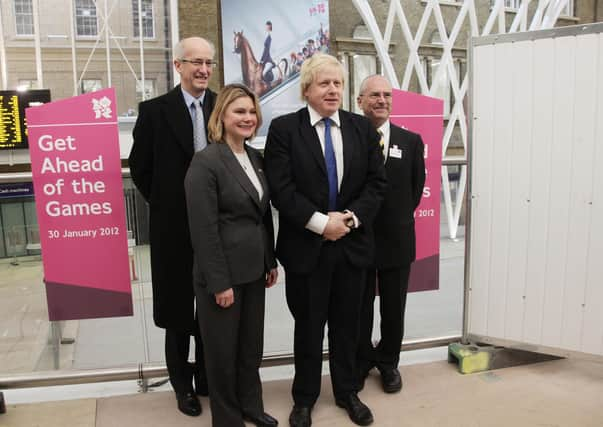How my mother and I invented ‘levelling up’ in 2014 - but Boris Johnson was the only top Tory paying attention: Justine Greening


‘Social mobility – it’s helping people who need wheelchairs get around more easily isn’t it?’ It was 2014.
I was talking with my mother about how I was doing more work on social mobility in Cabinet. Her expression steadily told me she didn’t understand the term.
Advertisement
Hide AdAdvertisement
Hide AdIt was the moment I realised I needed a better phrase to describe social mobility and equality of opportunity.


It had to be something instinctive and memorable that could get real cut through. The phrase I came up with was ‘levelling up’.
It described not just what equality of opportunity is about, but also how you deliver it – not taking opportunities away from those with them, but by spreading them to those without.
You level up. At the time I was a Cabinet Minister and my special adviser told me the phrase would never catch on.
Advertisement
Hide AdAdvertisement
Hide AdI challenged him to come up with something better, but when he couldn’t, we stuck with it and I used it more and more.


When it featured in the Queen’s Speech this week, a journalist reminded me afterwards how I’d used it in my 2015 general election acceptance speech in Putney. Neither David Cameron nor Theresa May picked up on the phrase as I wove it into more and more of my speeches, including at Conservative Party conference, our Department for Education language whilst I was Education Secretary and more than a few columns for The Yorkshire Post.
But there was one person who did understand its importance to a wider public just as much as I did: Boris Johnson.
In the 2019 Conservative Party leadership contest I met my erstwhile London campaigning colleague to talk about putting ‘levelling up’ at the top of his agenda should he become party leader. Of all the candidates, Boris instantly understood why ‘levelling up’ matters and caught my own enthusiasm. And, as last week’s local and mayoral elections show, voters also understand perfectly well what levelling up would mean for their lives.
Advertisement
Hide AdAdvertisement
Hide AdThey understand it’s about tangible progress towards having the same chances to get on in life. Voters understand it’s the opportunity to make the most of yourself, whoever you are and wherever you’re living.
In spite of what some in the Westminster bubble insist, the issue now isn’t defining levelling up. People know what it is. The issue now is delivering levelling up.
That means getting a grip on a complex agenda, in a way no Government or generation has been able to do.
Governments of all stripes have tried in different ways to achieve similar things. Ideas of creating more jobs on the doorstep aren’t new. One of my memories growing up in Rotherham was driving past a derelict site just off the M1 with a sign lashed onto the security fence that said “Rotherham Enterprise Zone”.
Advertisement
Hide AdAdvertisement
Hide AdCompanies came to get the tax breaks but left as soon as they ended.
There have been countless regeneration projects over the years. If we really want to shift things we need to learn from past failures of all Governments, however well-intentioned.
I believe the key to success is breaking down the complex problem of levelling up into its distinct parts and developing plans to systematically address each one.
Through the Social Mobility Pledge, working with businesses, universities, charities and the public sector who are committed to this agenda, we’ve done just that.
Advertisement
Hide AdAdvertisement
Hide AdWe have identified 14 “Levelling Up Goals” (www.levellingupgoals.org) that, if we can achieve them, mean we close the opportunity gaps.
Some of the goals cover education, some are around access to opportunity, others focus on day-to-day life that either helps or hinders us – housing, health, digital access, environment.
The goals have cross-party support and are championed in Parliament by Keighley MP Robbie Moore, amongst others. Now the Levelling Up Goals are being used by major businesses like BP, Persimmon and Direct Line Group, public sector employers like the BBC and Channel 4, universities including Bradford, York St John and York, NHS Trusts and Government departments such as the Ministry of Justice.
It’s a standard architecture every organisation, large or small – even a government – can use to define and then set out its own contribution and plan to help level up our country.
Advertisement
Hide AdAdvertisement
Hide AdWith measurements behind each goal, we can also track progress. The goals are simple and they help us see how we all have a role to play.
Even if you only help to impact one goal, it’s better than none, and collective action is how we will succeed.
Boris Johnson was right to get excited about the importance of “levelling up” during our pivotal meeting in 2019. Now he has to focus relentlessly on its delivery.
The Levelling Up Goals can ultimately prove even more powerful than the term itself as they provide the framework through which we can finally make a difference to people’s lives.
Advertisement
Hide AdAdvertisement
Hide AdAchieving Boris’s political success to date has relied on the levelling up phrase, continuing his success will rely on delivering the Levelling Up Goals.
Justine Greening was Secretary of State for Education and was born in Rotherham.
Support The Yorkshire Post and become a subscriber today. Your subscription will help us to continue to bring quality news to the people of Yorkshire. In return, you’ll see fewer ads on site, get free access to our app and receive exclusive members-only offers. Click here to subscribe.
Comment Guidelines
National World encourages reader discussion on our stories. User feedback, insights and back-and-forth exchanges add a rich layer of context to reporting. Please review our Community Guidelines before commenting.